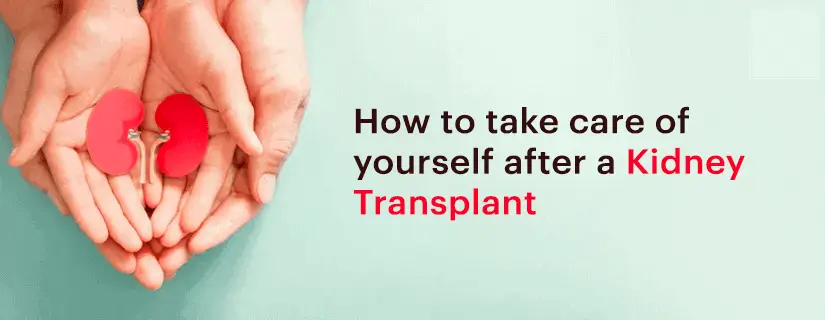-
Doctors
-
Specialities & Treatments
Centre of Excellence
Specialties
Treatments and Procedures
Hospitals & Directions HyderabadCARE Hospitals, Banjara Hills CARE Outpatient Centre, Banjara Hills CARE Hospitals, HITEC City CARE Hospitals, Nampally Gurunanak CARE Hospitals, Musheerabad CARE Hospitals Outpatient Centre, HITEC City CARE Hospitals, Malakpet
HyderabadCARE Hospitals, Banjara Hills CARE Outpatient Centre, Banjara Hills CARE Hospitals, HITEC City CARE Hospitals, Nampally Gurunanak CARE Hospitals, Musheerabad CARE Hospitals Outpatient Centre, HITEC City CARE Hospitals, Malakpet Raipur
Raipur
 Bhubaneswar
Bhubaneswar Visakhapatnam
Visakhapatnam
 Nagpur
Nagpur
 Indore
Indore
 Chh. Sambhajinagar
Chh. SambhajinagarClinics & Medical Centers
Book an AppointmentContact Us
Online Lab Reports
Book an Appointment
Consult Super-Specialist Doctors at CARE Hospitals
How to take care of yourself after a Kidney Transplant
Updated on 16 April 2022

Table of Content
You might feel like you have another chance at life after receiving a kidney transplant. Transplants can provide many benefits, such as improved health and more freedom to do the things you love. Please keep in mind, however, that kidney transplants are medical treatments, not a cure. You will need to take good care of yourself and your transplanted kidney. At this moment, your health is of the utmost importance. Being actively involved in your care requires you to attend clinic appointments at the best kidney transplant hospital in Hyderabad, have your lab work drawn, communicate with members of your care team, and understand how to take care of your new kidney.
In order to take care of your kidney, you will need to:
- After a kidney transplant procedure, you should follow the directions on your medication, and consult your doctor before taking any other medications, including over-the-counter medication and dietary supplements.
- Do not smoke, drink alcohol, or take other medications without first consulting your doctor.
- Avoid any person who has a cold or infection, and get in touch with your doctor if you are feeling ill.
- Your doctor will direct you to draw your labs and run any additional tests needed.
- Follow restrictions on lifting, walking, showering, and active rest.
- Return to work after 4-6 weeks following the transplant.
The best way to follow a healthy eating plan after a transplant
Whether you can eat or drink a variety of foods after your transplant depends on whether you were on dialysis before. The food choices you can make will be fewer, but eating healthy is still important. It can lower your chances of heart disease, diabetes, and other health issues, such as obesity and hypertension.
You should do the following:
- Plan a low-fat and low-salt diet.
- It’s usually best to drink at least two litres (68 ounces) of water a day, along with non-sugary beverages.
- Caffeine and alcohol should be limited.
- fruits and juices that contain grapefruit and starfruit should not be consumed, as well as pomegranates or pomegranate juice.
- Reduce your risk of food poisoning and infections by avoiding spoiled, mouldy, and expired foods.
Make sure your diet is healthy and fits your new kidney. Consult your dietitian for help.
Exercises to be performed
You need to take good care of your body after the surgery so here are some liver transplant post-operative care tips. In the first several weeks after transplant surgery, you should try to stay active five days a week or more. Maintaining a healthy weight and maintaining your mood are made possible by being active.
Find out which exercises are right for you, how often, and for how long you should exercise, by discussing it with your transplant team. To increase your chances of continuing to do a healthy activity, pick activities you enjoy. Among the activities of daily life include walking, bicycling, swimming, and gardening.
Keeping yourself from becoming infected
In addition to lowering your immune system, immunosuppressive medicines prevent your body from rejecting your new kidney. Infections become a problem as a result.
You should follow these steps to prevent getting an infection:
- Wash your hands frequently:
- Before eating anything (even a snack!)
- Every time you use the restroom.
- When you get home from work.
- Maintain distance from sick people if possible.
- Vaccines, such as measles, mumps, and nasal flu vaccines, should be avoided by people who recently received such a vaccine. When people receive a live vaccine, they have a weak form of the actual virus, and the virus can spread from them to others within two weeks of receiving the vaccine.
- Eat only from buffets or cafeteria settings, avoid spoiled, contaminated, or expired food, and cook meat to the proper temperature.
- Be sure to speak with your transplant team before travelling overseas. If you’re travelling to a country with a lot of infectious diseases, they will help you obtain medicine and vaccinations to prevent them, as well as give you tips to decrease your risk of getting infected. Many countries have tap water that may contain bacteria, so it is best to drink bottled water instead of tap water.
- If you plan to get a permanent tattoo, take steps to reduce the chance of infection, such as waiting six months after your transplant and using an artist and parlour licensed to tattoo.
The safety of vaccine shots after a kidney transplant
In addition to helping your body protect you from infection, vaccines can also exacerbate your transplant-related complications. Be sure to discuss any vaccines with your transplant team prior to undertaking them.
The following should be done:
Vaccines that are life, such as those for chickenpox (varicella-zoster), should be avoided. As a result of your weakened immune system, live vaccines contain a weak form of the virus and can replicate in your body, which can lead to infection.
You should wait at least three months after your transplant before getting a flu shot. Then, you should only get the vaccine every year, and avoid the nasal flu vaccine (which is a live vaccine).
Vaccines are generally considered safe:
- COVID-19
- Diphtheria-pertussis-tetanus
- Flu
- Hepatitis A
- Hepatitis B
- Inactivated polio
- Pneumovax
- Shingles
The effects of a transplant on sex and pregnancy
If your kidney disease or dialysis caused a problem with sexual function and fertility, most of it returns following a transplant.
Your menstrual cycle may become more regular after a kidney transplant, so you may find it easier to get pregnant. To avoid getting pregnant after a transplant, you should use birth control for at least one year.
It is important that you and your partner discuss safe sex, birth control, and pregnancy with your transplant team.
CARE Hospitals is regarded as the best kidney transplant hospital in Hyderabad. We have a team of top kidney doctors aiming of providing the best possible care for kidney-related ailments.
To Book an Appointment, call:
ENQUIRY FORM
SELECT CATEGORIES
-
Neurosciences (16)
-
Neurology (37)
-
Neurosurgery (14)
-
Orthopaedics (48)
-
Oncology (33)
-
Obstetrics and gynecology (52)
-
Pulmonology (23)
-
Urology (20)
-
Nephrology (13)
-
Psychiatry (7)
-
Dietetics and Nutrition (111)
-
General Medicine (63)
-
Cardiac Sciences (32)
-
Vascular & Endovascular Surgery and Interventional Radiology (15)
-
Gastroenterology (46)
-
Endocrinology (23)
-
Plastic Surgery (10)
-
Critical Care Medicine (5)
-
COVID-19 (16)
-
Dermatology (16)
-
Emergency Care (1)
-
Ophthalmology (4)
-
Pediatrics (14)
-
Laparoscopic and Bariatric Surgery (8)
-
ENT (15)
-
Kidney Transplant (1)
-
Liver Transplantation and Hepatobiliary Surgery (5)
-
General Surgery (3)
-
Internal Medicine (5)
-
Medicine Information
YOU MAY ALSO LIKE
RECENT BLOGS
-

Preterm Birth (Premature Birth): Symptoms, Causes, Treatment and Prevention
13 May 2025
Read More
-

Rotablation Angioplasty: Benefits, Treatments, And Recovery Time
9 May 2025
Read More
-

What Is The Difference Between IUI and IVF?
9 May 2025
Read More
-

Venous Malformations: Causes, Symptoms, and Treatment
30 April 2025
Read More
-

Varicose Vein Foam Sclerotherapy: Treatment, Benefits, and Procedure
30 April 2025
Read More
-

Radiofrequency (RF) Ablation Treatment for Varicose Veins: Know More
30 April 2025
Read More
-

Varicose Vein Sclerotherapy: Treatment, Benefits, and Procedure
30 April 2025
Read More
-

Varicose Vein Endovenous Laser Ablation: Procedure, Benefits, Risks
30 April 2025
Read More
Have a Question?
If you cannot find answers to your queries, please fill out the enquiry form or call the number below. We will contact you shortly.


